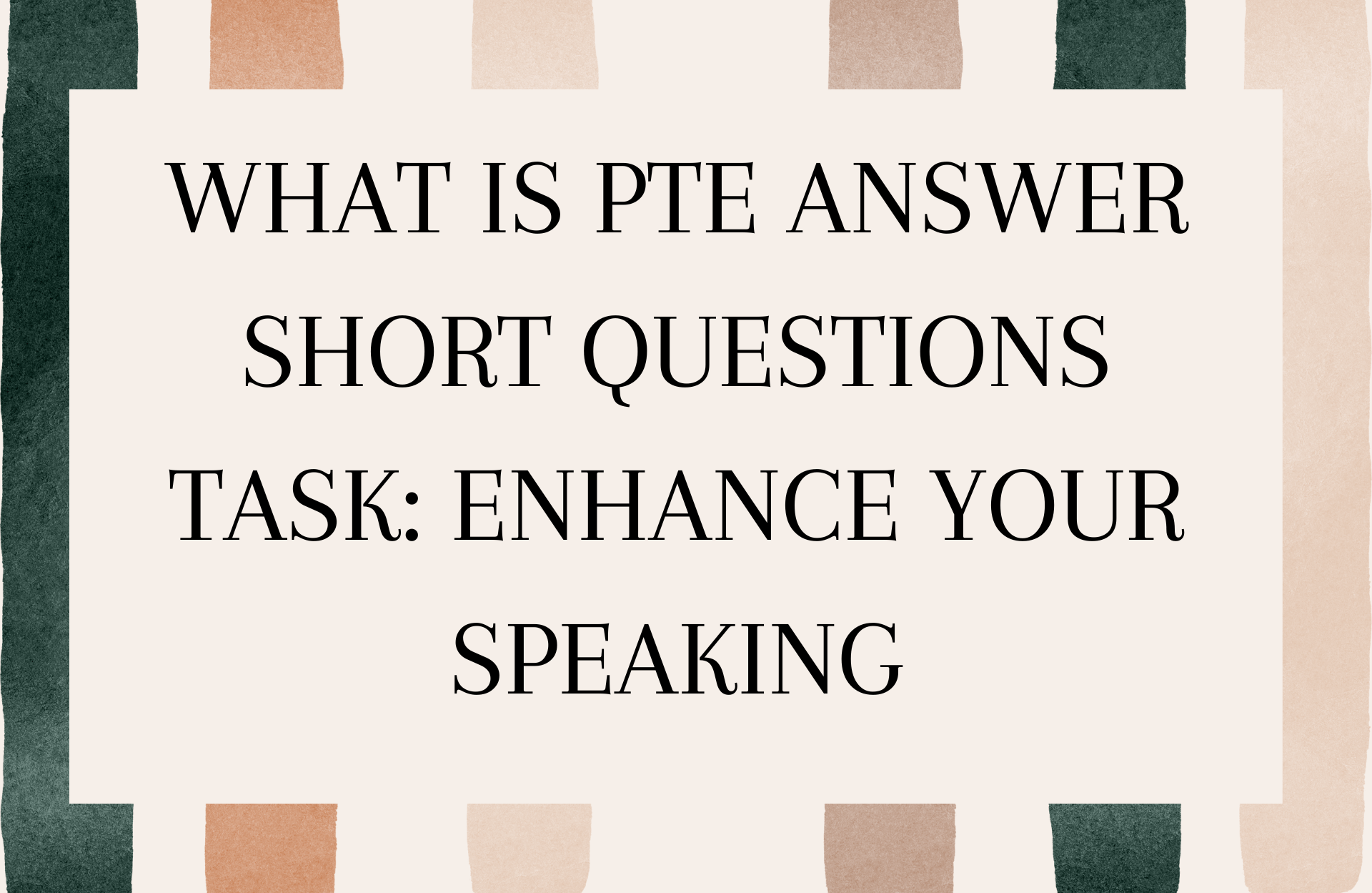What is PTE Answer Short Questions Task: The Listening and Speaking skills are both used in the PTE Answer Short Questions task. For this job, the Speaking part is more important. You can think of this combined PTE task as a round of Rapid Fire questions to help you understand it better. In this part, an audio file is played that asks the individual a set of questions. The candidates have only a few seconds to answer each of these questions.
Both the question and the answer are short, clear, and to the point. PTE has started to add relevant movies and pictures to the questions. These are questions to which the candidate may or may not know the answer, but he or she must notice quickly and give a quick answer. How to Get a Better Score on the PTE Short Question Task
Aside from the basics of what you need to know for a test, there are always some tips that can help you learn faster, remember more, or use what you know in the best way possible. As the PTE test is a big step for many people who want to study abroad, it is important to make sure that you are ready for it.
Together, a candidate’s PTE Listening skills, PTE Reading skills, PTE Writing skills, and PTE Speaking skills make up their PTE Scores, which show how well they know the language. No matter how sure of yourself you are, you should practice and pay equal attention to each skill. Without practice, the pattern of questions can be surprising, and you can lose points if you don’t know how to use your time well.
PTE Answer Short Questions Task:
Here are some ways to improve your Answer Short Questions PTE Speaking Skill score.
Don’t think too much about the answer
The questions in this part are straight forward and don’t require much thought. Basically, you either know the answer to every question in this part or you don’t. There is no in-between. Since there is no negative marking in the PTE marking scheme, the candidates can still choose to give a safe answer if they don’t know the right answer.
Answer quickly
As soon as the question is over, the microphone on the screen changes from listening to recording. The candidate shouldn’t wait to be told to answer, but should answer on their own. This saves time, but more importantly, if the answer isn’t given within 3 seconds, the microphone stops picking up sound and the state changes to “complete.”
It’s best not to think too hard because these are direct questions, and the answer is usually the first thing that comes to mind.
Pay close attention
Asking candidates to pay close attention is an idea that doesn’t get enough attention. This is because candidates often lose focus during exams because they are worried about time or thinking about the answer they gave before. If you don’t pay attention, you might get the wrong answer to an easy question like “What are two words that mean the same thing?”
Focusing exercises won’t hurt you for this job, and they will also help you with a lot of other PTE Listening skills tasks.
Don’t try to come up with clever answers.
Most of the time, the answers are so easy that candidates look for other words or answers. This is a terrible idea because the made-up answers are way out of context. In this job, what helps is not to think carefully, but to think quickly. It’s all about what you already know, so if you want to do better, you should practice thinking faster.
Stay calm and pay attention.
Even if the last question was completely wrong or time is running out, worrying about these things will never help you do better on the test. To save time, it’s smart to stay on task and answer what’s left properly and in the best way.
During test prep, you can try simple ways to calm your nerves and improve your ability to concentrate. It’s also helpful to practice managing your time while answering questions. Before the test starts, people should try to calm their jitters.
Fix the wrong answers
You can answer a question until the state of the question changes to “completed.” The answer might not come out right on the first try, and the person being tested can use the remaining time to try again. The answers are recorded so they can be graded, and the whole recording is listened to before the grade is given.
Clear your throat
Before the questions start, it is a good idea to clear your throat because if you are quiet for a long time, your voice may crack. To speak properly, you need to have a clear voice, not mumble, take breaks between words, and say words the right way. If any of these goes wrong, the answer should be given again right away.
Don’t make a list.
First of all, the questions don’t have any important information that could be used in the answer, so there’s no point in taking notes. Also, each question only lasts a few seconds, so taking notes might just confuse the person taking the test. And finally, the answer is usually just one or two words, which means it doesn’t need to be put into a sentence. Taking notes would be a waste of time.
Try out the most-asked questions.
The questions that show up again and again on the PTE Answer Short Questions list are the ones that are asked most often. Candidates can practice with sample test sheets, which have different kinds of these questions and some questions that are asked over and over again.
In this part of the PTE Speaking Skills test, the most common and often-asked questions are about synonyms, antonyms, word meanings, and general knowledge.
Improve your vocabulary and how you say words
Most of these questions are about how well you know the language, so the best way to pass this part is to improve your vocabulary. If you say a word wrong, the machine won’t be able to figure out what it means. This will cause the person taking the test to lose points.
During the PTE Speaking skills test, the candidates should speak clearly and with confidence. People should avoid stumbling over their words, mumbling, and taking long breaks when they talk. It’s also important to pay attention to punctuation when making words to talk.
Summary:
- The PTE Answer Short Questions task requires quick and concise responses to a set of questions.
- Candidates should answer promptly within a few seconds to ensure their response is captured.
- Paying close attention and avoiding overthinking is crucial for providing accurate answers.
- It is important to speak clearly, and confidently, and use proper pronunciation during the task.
- Practicing common question types and improving vocabulary can enhance performance in this task.



